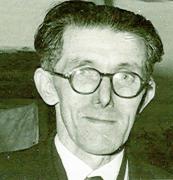|
|
||||||||||||||||||||||||
 |
Featured person
Recently added |
St Kilian (640 - 689): |
||||||||||||||||||||||
Kilian was an Irish missionary remembered principally as the Apostle of Franconia ("der Frankenapostel”), Franconia being modern-day nothern Bavaria. “Kilian” is the usual German spelling, some variants are “Cillian” in English, “Cillien” in French, “Ceallachán” in Irish. He was also active (very active according to sources) in Thuringia.
He is often held to have been born in or around 640 at Mullagh, County Cavan. Early sources in Latin refer to “Kylianus Scotorum genere nobilis” which would seem to place him in modern-day Ulster; Tomás Ó Fiaich refers to “strong local tradition” that he came from Mullagh. On the other hand, Pádraig Ó Riagain writes that there is no early evidence for a Kilian from Mullagh, and thinks the least unlikely case that Kilian of Mullagh was, if anyone, Ceallachán of Cluain Tiobrad, modern-day Clontibret, County Monaghan.
Otherwise little or nothing is known about him until he left Ireland, accompanied by eleven others, for Europe, proceeding up the Rivers Rhein and then Main, until reaching Würzburg. There he encountered the Ducal family who were pagans. A very active evangeliser, he managed to convert the Duke, Gozbert, though part of this was that Kilian felt obliged to convince his new convert that his marriage to his widowed sister-in-law, Geilana. Several versions of his story then have him visiting Rome and particularly the Pope, but historians largely dismiss this; the Neue Deutsche Biographie describes the story as a “back projection of the anglo-saxon Boniface” (“eine Rückprojektion bonifatianisch-angelsächs”).
What is generally agreed is that he met a violent death: Butler’s Lives of the Saints states that this fact is “historically established”, this also the view of the Neue Deutsche Biografie and Ó Fiaich who regards the “Passio Prima” from 752 as reliable. Further, this was at the instigation of the furious, jilted Geilana. He was murdered along with two colleagues or companions, though sources do not agree which ones. This is generally held to have occurred in 689. In 752, the first Bishop of Würzburg, Burghard or Burchard, had the relics translated to the Salvator Cathdral in the city. The “cult” of Kilian was supported by, amongst others, Charlemagne, and is still strong in the region today; a secondary cult was established in Ireland by the 9th century at the latest. The former Salvator Cathedral’s site is now that of the Neumünster where the relics reside in a bespoke golden reliquary presented in 1987; a relic was presented to St Cillian's Church in Mullagh in 1991.
Würzburg has an annual “Kilianifest” or Cillian Festival; he is also venerated in Paderborn, as its patron saint; he is also the patron saint of the parish of Tuosist in County Kerry, Ireland. His feast day is 8 July. Kilian is still a common forename in Germany and Germanic-language countries, as well as Australia and of course Ireland. Mullagh has a heritage centre focused on him, and as well as several churches in various countries, not least in Würzburg itself, whose St Kilian’s Cathedral is said to be the fourth-largest Romanesque church in Germany. Several towns or villages are named for him, one as far afield as Minnesota, USA. St Killian’s College near Carnlough, County Antrim, was founded by the amalgamation of three schools in the area; it operates from the premises of two of those schools, the former St Comgall's in Larne and St MacNissi’s at Garron Tower further north on the coast.
| Born: | 640 |
| Died: | 689 |
| Richard Froggatt |
| Bibliography: Neue Deutsche Biographie (Bayerische Akademie der Wissenschaften, Berlin 1977,vol 11); The New Catholic Encyclopedia (Catholic University of America, 1967, vol VIII, 179; contributor Tomás Ó Fiaich); David Hugh Farmer: The Oxford Dictionary of Saints (2nd ed, 1987, p 251); Bibliotheca Hagiographica Latina, antiquiae et media aetatis (Socii Bolandiani, Brussels 1900, “Kilianus”); Pádraig Ó Riagain: A Dictionary of Irish Saints (Dublin, Four Courts Press, 2011); Butler’s Lives of the Saints (Tunbridge Wells : Burns & Oates, 1995). |


Home | Our Policies | Plaques | Browse | Search | Sponsors | Links | Help | Contact
Privacy & Disclaimer | Cookie Policy | Site Map | Website Design By K-Point
© 2024 Ulster History Circle









